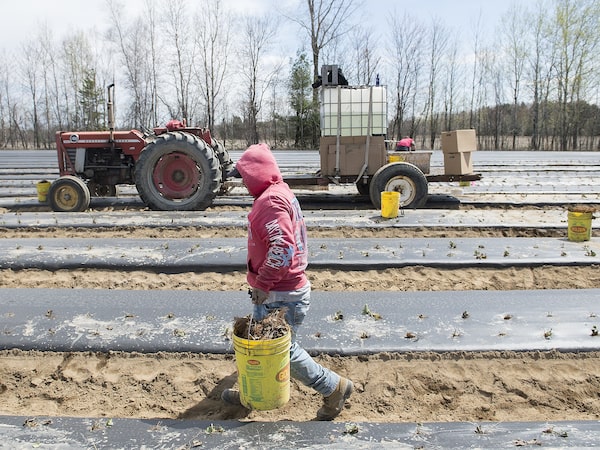
A temporary foreign worker from Mexico is shown on a berry farm in Mirabel, Que., on May 6, 2020.Graham Hughes/The Canadian Press
A pattern has emerged in Liberal immigration policy over the past year: Ignore mounting evidence of trouble, dismiss rumbles of criticism and, finally, take the smallest possible action to avert an all-out calamity.
There was abundant evidence for months that the pace of new arrivals, particularly temporary migrants, was putting unacceptable strain on housing in big cities and other social infrastructure. But it was not until November that the Trudeau government took the tentative step of tamping down the growth in permanent immigration – misleadingly referred to as “stabilizing” by the government. Even with the change, permanent immigration targets will rise this year and next, with an extra 55,000 people admitted over that two-year span.
Last week, there were half-measures to curb the eye-popping growth in the ranks of international students, with Immigration Minister Marc Miller announcing a two-year cap on international study visas. But that cap is being imposed with visas already at historically high levels.
Of greater concern is the government’s unwillingness to reverse policies that set the stage for that rise. Students can work full-time off-campus, often while attending private institutions with less than rigorous curriculums. Upon graduation, they’re eligible for a work visa good for up to three years, a big advantage in securing permanent residency.
The Liberals managed to quietly transform the student visa program into what is effectively a temporary foreign workers’ program, with a fast track to permanent status. None of the government’s tweaks to date change that reality.
And now the next immigration emergency is bubbling up. This time it’s refugee asylum claimants – most notably from Mexico – reaching record levels. Quebec Premier François Legault has flagged his concerns with an outsized burden landing on his province, but it’s clear from the federal government’s own numbers that there is a broader issue.
In the first 11 months of last year, 128,690 people made asylum claims in Canada, more than double the number in the prepandemic year of 2019. Claims from Mexican nationals in 2023 accounted for 17 per cent of the total, nearly double their proportion in 2019.
Does that mean there is a humanitarian crisis brewing in Mexico? Certainly, the threat posed by drug cartels is real and ample motivation for many Mexicans to flee for the safety of Canada.
But the approval rates for asylum applications from Mexico tell a different story. For the first 11 months of 2023, just over 42 per cent of applicants were granted refugee status. That was the third-lowest approval rate for the 175 countries listed in government data. Refugee advocates say immigration officials are downplaying the threats that some Mexicans face, but the statistics indicate that there are a large number of people claiming refugee status who are actually economic migrants.
The Liberals’ policy decisions have played a role. Mexicans aren’t required to obtain visitor visas to come to Canada. And in 2019, the Trudeau government scrapped a Conservative policy that limited rights for asylum seekers from 42 countries designated as relatively safe, including Mexico.
The surge in the number of applicants from Mexico since 2019 has contributed to an explosion in the claims backlog, which has more than doubled since 2021 to 126,131. If Canada stopped accepting refugees today, it would take more than three years to clear that backlog at current processing rates.
The refugee system is quickly approaching a crisis point; the Liberals need to act quickly before that happens. Mr. Legault has floated the idea of re-imposing visitor visas for Mexican nationals, with Public Safety Minister Dominic LeBlanc saying the federal government is considering that option.
If that’s all Ottawa does, it will be just another belated half-measure. The Liberals need to go further and take another look at the Harper-era safe-country program. Courts struck down some of its provisions (including needlessly cruel provisions such as denying health care benefits). But the core idea is sound: Reducing the incentive for economic migrants from less risky countries to make asylum claims, including by fast-tracking their applications.
Canada has a responsibility to refugees, but that responsibility does not preclude the government from closing obvious loopholes in the system that are being exploited by those without a plausible asylum claim.